Unit5_Can_you_come_to_my_party_SectionA(已修改)
2020-2021学年七年级下册英语鲁教版Unit5教案
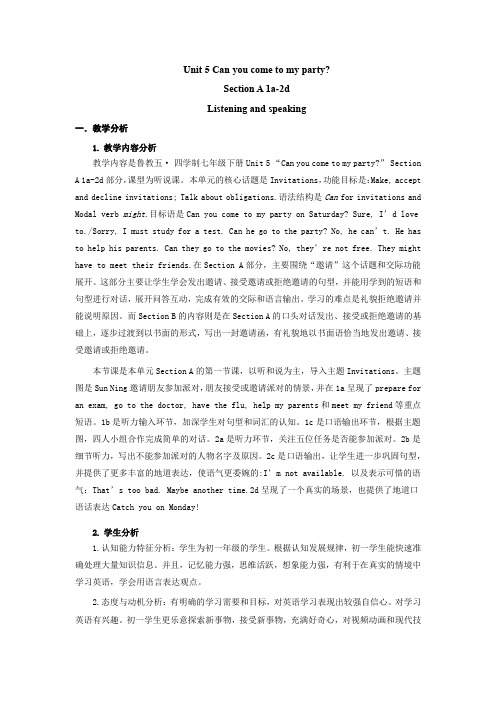
Unit 5 Can you come to my party?Section A 1a-2dListening and speaking一.教学分析1.教学内容分析教学内容是鲁教五·四学制七年级下册Unit 5 “Can you come to my party?”Section A 1a-2d部分,课型为听说课。
本单元的核心话题是Invitations,功能目标是:Make, accept and decline invitations; Talk about obligations.语法结构是Can for invitations and Modal verb might.目标语是Can you come to my party on Saturday? Sure, I’d love to./Sorry, I must study for a test. Can he go to the party? No, he can’t. He has to help his parents. Can they go to the movies? No, they’re not free. They might have to meet their friends.在Section A部分,主要围绕“邀请”这个话题和交际功能展开。
这部分主要让学生学会发出邀请、接受邀请或拒绝邀请的句型,并能用学到的短语和句型进行对话,展开问答互动,完成有效的交际和语言输出。
学习的难点是礼貌拒绝邀请并能说明原因。
而Section B的内容则是在Section A的口头对话发出、接受或拒绝邀请的基础上,逐步过渡到以书面的形式,写出一封邀请函,有礼貌地以书面语恰当地发出邀请、接受邀请或拒绝邀请。
本节课是本单元Section A的第一节课,以听和说为主,导入主题Invitations。
主题图是Sun Ning邀请朋友参加派对,朋友接受或邀请派对的情景,并在1a呈现了prepare for an exam, go to the doctor, have the flu, help my parents和meet my friend等重点短语。
初中英语《Unit5Canyoucometomyparty》单元教学设计以及思维导图
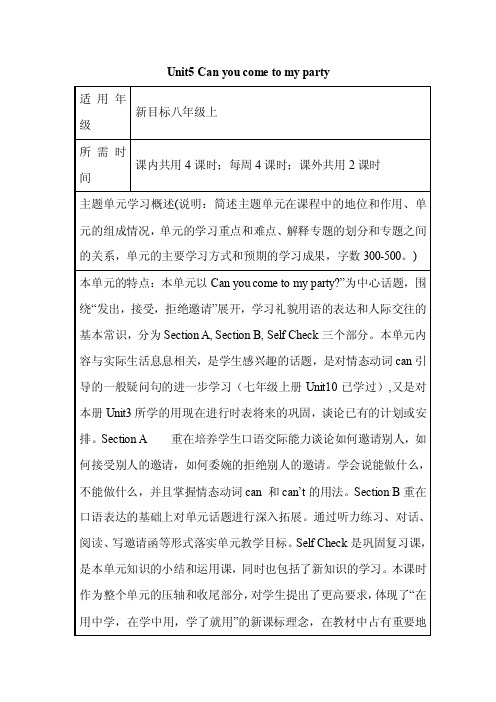
1.本节课教学设计实施效果良好,调动了学生学习英语的
积极性,活跃了课堂的气氛。
2、对学生能及时的进行精神的鼓励,提高了学生参与活
动的积极性。
3、在本节课的教学过程中,本人采用情景教学法和鼓励
学生采用小组合作方式进行学习。课堂教学必须以学生为 评价要
主体,教师要鼓励学生大胆、积极地参与各项教学活动, 点
主题单元学习目标 知识与技能: 依据新课标要求和本单元、本课时的特点,制定以下教学目标: 1. 知识目标:掌握重点短语和重点句型:study for a test,help my parents,visit my aunt,go to the doctor,go to the guitar lesson,play soccer,go to the mall,go to the movies,go to my cousin’s birthday party,babysit my sister,have tennis training 等。Can you come to my party?Sure,I’d love to./I’m sorry, I can’t. I ... . 2. 能力目标 a.根据日程表安排写回信,提高学生写作水平。 b.培养语言表达能力,合作沟通能力,归纳概括能力,分析解决问题 能力。 3. 情感目标 培养学生使用礼貌用语的能力,学会真诚、坦然与他人相处。。 过程与方法:在整个单元教学中,通过锻炼学生的听说读写能力,让
Unit5 Can you come to my party 适用年
新目标八年级上 级
所需时 课内共用 4 课时;每周 4 课时;课外共用 2 课时
间
主题单元学习概述(说明:简述主题单元在课程中的地位和作用、单 元的组成情况,单元的学习重点和难点、解释专题的划分和专题之间 的关系,单元的主要学习方式和预期的学习成果,字数 300-500。) 本单元的特点:本单元以 Can you come to my party?”为中心话题,围 绕“发出,接受,拒绝邀请”展开,学习礼貌用语的表达和人际交往的 基本常识,分为 Section A, Section B, Self Check 三个部分。本单元内 容与实际生活息息相关,是学生感兴趣的话题,是对情态动词 can 引 导的一般疑问句的进一步学习(七年级上册 Unit10 已学过),又是对 本册 Unit3 所学的用现在进行时表将来的巩固,谈论已有的计划或安 排。Section A 重在培养学生口语交际能力谈论如何邀请别人,如 何接受别人的邀请,如何委婉的拒绝别人的邀请。学会说能做什么, 不能做什么,并且掌握情态动词 can 和 can’t 的用法。Section B 重在 口语表达的基础上对单元话题进行深入拓展。通过听力练习、对话、 阅读、写邀请函等形式落实单元教学目标。Self Check 是巩固复习课, 是本单元知识的小结和运用课,同时也包括了新知识的学习。本课时 作为整个单元的压轴和收尾部分,对学生提出了更高要求,体现了“在 用中学,在学中用,学了就用”的新课标理念,在教材中占有重要地
unit 5 can you come to my party Section A
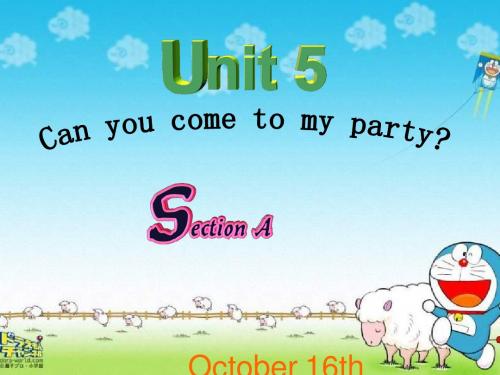
Exercises in class
一.
补全对话。 补全对话
1. ----Can you come to my birthday party? ----Sure, I’d love to 2. ----Can she go to the movies? ----No, she can’t . She has to study for a test. 3. ----Jim, can you________________ (去听音乐 go to the concert 会)the day after tomorrow (后天). 后天) 后天 ----Sorry, I can’t (上钢琴课) 上钢琴课) 4. ---- Can your brother go to the baseball game? ----No, he can’t. He has to go to the dentist. . I have a piano lesson . .
October 16th
Can you ….?
- Yes, I can . - No, I can’t .
Step 1: Presentations
I’m free this weekend, but next weekend I will be busy.
go to a party I have to ________________.
Claudia, Can you come to my party on Saturday?
I’m sorry . I’m going swimming _______.
Claudia, Can you come to my party on Saturday?
八年级英语上册 Unit 5《Can you come to my party》教案 人教新目标版

Unit 5 Can you come to my party?I. Analysis of the Teaching Material1.Status and FunctionThe topic of this unit is about invitation. It teaches the students how to give or receive an invitation. It’s close to the everyday life. So we’d better raise the students learning interest first.2.Teaching aids and demands(1)Knowledge ObjectsStudents must learn to make invitation. They must learn to say yes and say no to aninvitation and give their reasons.(2)Ability ObjectsTo improve the students’ ability of listening, speaking, reading, writing.(3)Moral ObjectsWe teach this lesson in order to learn how to accept or refuse an invitation of foreigncountries politely. It will teach the students good manners. If he or she holds a partyat home, He or she will feel happy when they can do something for others.(4)Teaching Key PointsThe key vocabulary and the key phrases of this unit(5)Teaching DifficultiesUsing the target language to improve the abilities of the studentsII. Target languageCan you come to birthday party?Yes, I’d love to.Sorry, I can’t. I have to look after my mother.When is the party?It’s at six on Monday.III. VocabularyTomorrow, weekday, invitation, match, whole, whom, another, concert, pity, free, American,Chemistry, training…IV. Learning StrategiesInductingCooperatingV. Teaching procedures.It includes five periods. (5个课时)The First PeriodI. Teaching Aims and DemandsKey vocabulary and phrasesTarget languageTo improve the students ability of Listening and speakingII. Teaching Key Points(1) Key PhrasesStudy for a test, have a piano lesson, go to the doctor, visit my aunt (2) Target language_ Can you come to my party on Sunday?_ Sure, I’d love to._ Can you come to my party on Sunday?_ Sorry, I have too much homework this weekend.I have to help my mum.I have to go to the doctor.III. Teaching DifficultiesUsing the target language to practice the oral English in pairsIV. Teaching MethodsCommunicative methodsPairworkV. Teaching Aids多媒体VI. Teaching ProceduresStep 1Before the class, let the students listen to the music, this can guide to the new lesson. Afterthis, ask thestudents to watch the movie, this can guide to the target language.Step 2 (1a)Learn the phrases and do the exercise in 1a.The answer is: b, d, a, c, eStep 3 (1b and 1c )First let the students read the dialogue in the picture. Then listen to it. (This activity provides guided oral practice using the target language). After the listening practice, ask the student to practice some invitations and refusals.Step 6 (Blackboard design)Unit 5How about…? politeWhat about…? impolite The second periodI Teaching aims and demands1. Knowledge ObjectsKey vocabularyTarget languageGrammar focus2. Ability Objects_ ListeningII. Teaching key points1. key vocabularyhey, baseball game, too much homework2. Target languageA: Hey, Dave! Can you come to the movies on Saturday? B: I’m sorry, I can’tI have too much homework.I have to help my mum.I have to go to my guitar lesson.I have to visit my aunt.III Teaching difficultiesGrammar focusIV Teaching methodsListening and speaking methods.Communicative approachPairwork.VI Teaching procedureStep IGreet the class and check the homeworkStep II (2a)First, make the preparation for listening. Read the sentences twice to the class. The first time you can read “can”, the second time you can read “can”. Then let the students listen .The answers for activity 2a are : 1. can’t , 2.can 3. can’t 4. can’t 5.canStep III (2b)Ask a student to read the sentences in the box.. Tell the students these are the reason why people can’t go to the party. Listen to the recording again and number the reasons 1~3 why they can’t go to the party .The answers are : a . 2 d . 3 e . 1Step IV (2c)This is an oral practice about the target the language . You can ask the student if they can give other reasons besides the ones in 2a . If they can, make a dialogue in pair . ( First , ask two who can do it well to make a model dialogue , then let them do it in pairs .Step V . ( Grammar focus)First , let the students read the sentences in the grammar box . Then write “ have to , has to ” on the blackboard , and tell them they are used to say no to an invitatio n . And then write “ be going to do something ” on the blackboard , tell the students we can say no to an invitation by talking about the future plan . After that , let them do exercises in order to master to the grammar .Step V. Blackboard designUnit 51. have to /has to + verbThey have to go to the acting lesson on Sunday.Lucy has to help her mom with the housework.Do they have to go to the acting lesson on Sunday.Yes, they do. / No, they don’t.Does Lucy have to help her mom with the housework?Yes, she does. / No, she doesn’t.2. Can you come to…? Sure, I’d love to. / Sorry, I can’t. I haveto…Can she come to…? No, she can’t. She has to…Step VI . HomeworkPlease write as many reasons as you can to refuse an invitationThe Third PeriodI Teaching aims and demands1. Vocabulary and phrases Oral practice2. Ability objectsReading, writing, communicative competenceII. Teaching key PointsReview vocabulary items and grammar focusIII. Teaching difficultyOral practice using the target languageI. Teaching methodsReading, writing methods and communicative approachV. Teaching proceduresA computerVI. Teaching proceduresStep IGreet the class and let a student to make a duty report. And then check the homeworkStep II (3a writing)Show the invitation in 3a to the students. Ask the students to fill in the blanks according to the information of the invitation.The answers are: can, party, when, on Friday, June 30 4:30Step III (oral practice)Practice the dialogue in 3a in pairs and then let some of the act the dialogue.Step IV (writing)Let the students fill in the card with details of an event. Then call your friends and invite them to the event.Step V Invite a friend (oral practice)Tell the students how to do the activity: Student A, you are Eliza. Look at page 82. Eliza , invite Lu Qing to go to the mall . Look at the calendar for this week and find a time when you can both go there.Use the dialogue in the box to start the activity , and then ask more questions to learn when both people aren’t busy . Help students to start the work, give them a hand if needed.The answers: Lu Qing and Eliza are both free on Wednesday afternoon , Friday afternoon , Saturday and SundayStep VI. SummaryToday we have learnt how to write an invitation and done a lot of practice.Step VII HomeworkGive your best friend an invitation to an event.The student who receives it must give a reply.Step III . Blackboard designUnit 51. Lu Qing and Eliza are both Free on :2. have fun /have a great timeWednesday afternoon 3. join/take part inFriday afternoon 4. have a piano lessonSaturday have a swimSunday have a lookThe Fourth Period I. Teaching aims and demands.Target languageOral practiceII. Ability objects.Listening skillSpeaking skillCommunicative competenceIII. Teaching key points1.Key vocabulary.Sunday, Monday, Tuesday, Wednesday, Thursday, Friday, Saturday Yesterday, today, tomorrow, the day after tomorrow2.Target language.What’s today?It’s Monday the 14th.Can you play tennis with me?When?Today.Sorry, I can’t.IV. Teaching difficulties.The target languageV. Teaching methods.Listening and speaking methods.VI. Teaching aids.A calendarA computerVII. Teaching procedure.Step 1Greet the class and check the homework.Step 2 (Section B 1a)Show the students a calendar, and ask a student to point out today’s date. Point to the number which shows the dates, and ask the students to copy them into the calendar in their book.Read the dates and let the students read after you.Step III (1b)1.Show the words on the screen:Yesterday, today, tomorrow, the day after tomorrow, weekday2.Let the students write the words below the correct days on the calendar in 1a.Step IV (1c)First ask two students to read the dialogue in the box. Then let them practice it in pairs by using the calendar in 1a.Step IX Blackboard designThe Fifth period I. Teaching aims and demands.1. Knowledge objectsE-mail messageWriting practiceReading practice2Ability objectsReading and writing skillCommunicative competenceII. Teaching key pointsReading passage主语+verb+-ing I have to…III. Teaching difficultiesReading and wring practice.IV. Teaching methodsReading and writing methods and communicative approach.V. Teaching aidsA calendarVI. Teaching proceduresStep 1Greet the class, do the duty report.Step 2 (3a )First, read the e-mail message to the students. Ask the students if they have any questions.If they do, answer them. Then let the students fill in the calendar on the book. After this, explain the key language points to them.Language points:1. Thank you for… (为……表示感谢)Thank you for helping me.Thank you for your invitation.2On ( 在某天,在某天的上午、下午或晚上)I’m going to the dentist on Sunday.Unit 5Sunday, Monday, Tuesday, Wednesday, Thursday, Friday, Saturday The____ the_____ the_____ the______ the_____ the____ the_____ Yesterday, today, tomorrow, the day after tomorrowOn Friday afternoon, I often play soccer.The answers to the calendar are:SundayMonday Cousin’s birthday partyTuesday Go to the dentistWednesdayThursday Tennis trainingFriday Study for the chemistry testSaturday Go to the moviesStep 3 (3b)First, tell the students when we talk about our future plans, we often use: I’m+verb+ing When we talk about what we must do, we use have to.Ask the students to fill in the blanks in 3b.The answers are: shopping, go to see, a test, I’m going, my family.Step 4 (3c)Let the students write an e-mail message to a friend. Say why you can’t visit next.Before the exercise, ask the students to give some possible answers and write them on the blackboard. So the students will feel easy to finish the writing exercise. After they finish it, Let them to correct it in groups first. Each group chooses theirs best one to read in front of the whole class.Step 5 ( planning a party )First read the conversation in the box together. Then ask the students to turn to page 88. Write down everything you have to do next week. Write in all the things you have to do .Ask the students to look at the list. Ask them “What day are you free?” This is when you can have your party.Step 6 (Self check 1 )Let the students to fill in the blanks with the words given. Change the forms of the words if possible. Then make their own sentences. The answers are: visit, playing, have to, study, comeStep 7 (Self check 2)Imagine you are Marie. Read the information and look at your schedule. Write replies to the invitation.VII. Summary and homeworkToday we have learnt how to write a e-mail to a friend. You can write another one to your frien after class.Step 8 Blackboard designUnit 51. Thanks for…2. on Sunday at 4:00Thanks for helping me. I’m going to the dentist on Sunday.Thanks for your invitation. I often get up at 4:00.。
鲁教版七年级英语下册Unit5 Can you come to my party? - Section B习题(附答案)
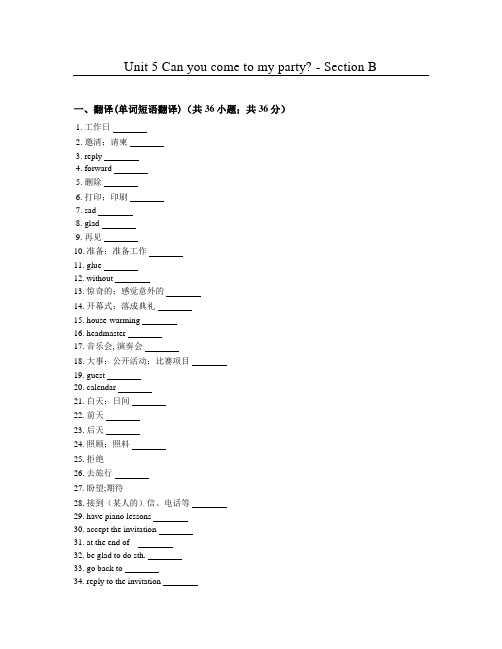
Unit 5 Can you come to my party? - Section B一、翻译(单词短语翻译)(共36小题;共36分)1. 工作日2. 邀清;请柬3. reply4. forward5. 删除6. 打印;印刷7. sad8. glad9. 再见10. 准备;准备工作11. glue12. without13. 惊奇的;感觉意外的14. 开幕式;落成典礼15. house-warming16. headmaster17. 音乐会, 演奏会18. 大事;公开活动;比赛项目19. guest20. calendar21. 白天;日间22. 前天23. 后天24. 照顾;照料25. 拒绝26. 去旅行27. 盼望;期待28. 接到(某人的)信、电话等29. have piano lessons30. accept the invitation31. at the end of32. be glad to do sth.33. go back to34. reply to the invitation35. make an invitation36. go to the concert二、翻译(根据中文提示完成句子)(共12小题;共12分)37. --- 今天是几号星期几?--- 今天是14号星期一。
--- today?--- Monday 14th.38. 多棒的一个主意啊!great idea it is!39. 她帮我把英语提高了这么多。
She helped my English so much.40. 看到她走我很伤心。
I'm her .41. 关于如何去做我已经有了一个很好的想法。
I have a great idea to do that.42. 我们全家这个月末要到武汉去看望我的叔叔和婶婶。
Our family is taking a trip to Wuhan at the end of this month my uncle and aunt.43. 我很乐意帮忙分担些聚会的准备工作。
八年级英语集体备课教案Unit-5-Can-you-come-to-my-party教案
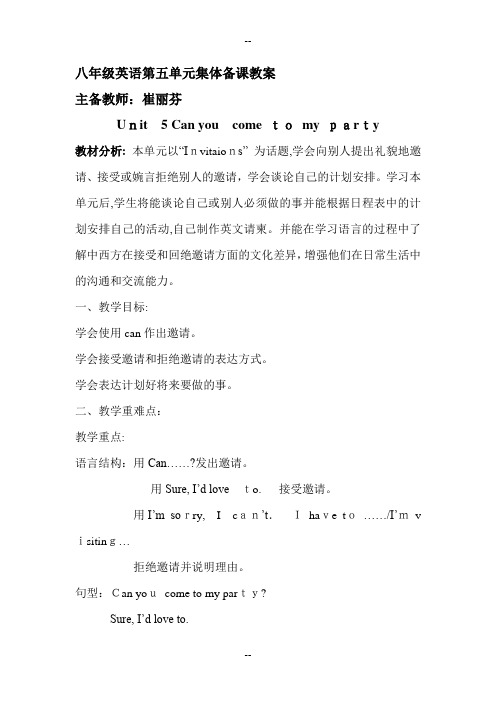
八年级英语第五单元集体备课教案主备教师:崔丽芬Unit 5 Can you come tomy party教材分析: 本单元以“Invitaions” 为话题,学会向别人提出礼貌地邀请、接受或婉言拒绝别人的邀请,学会谈论自己的计划安排。
学习本单元后,学生将能谈论自己或别人必须做的事并能根据日程表中的计划安排自己的活动,自己制作英文请柬。
并能在学习语言的过程中了解中西方在接受和回绝邀请方面的文化差异,增强他们在日常生活中的沟通和交流能力。
一、教学目标:学会使用can作出邀请。
学会接受邀请和拒绝邀请的表达方式。
学会表达计划好将来要做的事。
二、教学重难点:教学重点:语言结构:用Can……?发出邀请。
用Sure, I’d loveto. 接受邀请。
用I’m sorry,I can’t.Ihave to……/I’mv isiting…拒绝邀请并说明理由。
句型:Can youcome to my party?Sure, I’d love to.I’m sorry, I can’t. I have to ……教学难点;1. 使用Can……?发出邀请。
2. 使用Ihave to ……句型说明原因。
3.进行时表示未来计划。
三、情感、态度与价值观培养学生使用礼貌用语的能力,营造积极乐观的人际氛围,增进人与人之间的友谊,学会坦诚的与人相处,用英语交谈,培养交际能力,激发学生的主动性,激励学生自主学习。
四、课时设计:(5课时)Period 1: SectionA: 1a-2cPeriod2: SectionA: 3a-part4Period 3:Section B:1a-2c and part4Period 4: Section B: 3a-3cPeriod5:Revision and Selfcheck五、教学活动设计:本单元围绕“邀请和请求许可”这一话题,设计了三个任务型活动:Task1:对话展现提出邀请和接受邀请及拒绝邀请的英文表达。
鲁教版五四制英语七年级下册Unit 5 Can you come to my party - Section A

初中英语学习材料madeofjingetiejiUnit 5 Can you come to my party? - Section A一、翻译(单词短语翻译)(共18小题;共18分)1. 使做好准备;把......准备好2. 考试3. flu4. available5. 到……时;直到……为止6. 悬挂;垂下7. catch8. accept9. 拒绝10. 为…做准备11. 其他时间,别的时间12. 常去某处;泡在某处13. study for a test14. go to the doctor15. not...until16. have the flu17. go bike riding18. catch you on Monday二、翻译(根据中文提示完成句子)(共8小题;共8分)19. --- 星期六下午你能来参加我的聚会吗?--- 当然,我很乐意。
--- 对不起,我不能。
我必须去接我的朋友。
--- you to my party Saturday afternoon?--- , .--- , I can't. I meet my friend.20. 玛丽不能来参加聚会。
Mary to the party.21. 这个周末我有太多的作业要做。
I have homework do this weekend.22. 我记得去年秋天他来看你的时候,我们一起去骑自行车兜风了。
I we bike riding together when he visited you.23. 我很乐意来,但是恐怕我不能。
I'd love to come, I can't.24. 萨姆直到下个星期三才会离开。
Sam next Wednesday.25. --- 他能去看棒球赛吗?--- 不,他没时间。
他必须帮他的父母。
--- Can he to the baseball game?--- , he isn't . He must his parents.26. --- 放学之后你打算做什么?--- 我也不确定。
初中英语《Unit 5 Can you come to my party(1)》优质课教案、教学设计

Unit5 Can you come to my party? SectionA 教学设计教材分析:本单元主要围绕“can you come to my party?”这一主题展开各种教学活动,并以这一主题引出怎样接受或拒绝别人的邀请。
本节课是第一课时,内容为1a-2d 部分,围绕“邀请”这一话题,开展教学活动,并以这一主题引出怎样接受或拒绝别人的邀请。
本课旨在创造一个轻松、愉快的学习、交流环境,是一个涵盖听、说、读、写、演,学生通过“任务---探究---创造--- 评价”型教学的方法,在有趣、开放式的语言环境中,学会观察、思考、讨论、模仿运用语言和总结,培养学生综合运用这些知识进行英语交际的能力能力。
学情分析:本单元教材面对的是七年级下学期的学生,基本上都有四五年的英语学习年龄。
对于英语的基本学习出现以下问题:学得会,看得懂,会做题,可是不会说或不敢说。
同时学生的英语能力产生了一定的差距,特别是在知识和语言技能上的差距比较明显。
他们有一定的兴趣,渴望被肯定,但由于差距,有的学生接受能力差反映能力慢,害怕当众说英语,不敢表现自我。
教学理念:本单元语法以情态动词can 的用法为主,句型也是简单的表达难度不大,根据新课程标准提倡的任务型教学,在课堂教学中我们设计了不同形式的任务,以便充分训练学生的听、说、读、写技能,培养学生综合运用英语进行交际的能力,我结合本单元的题材,以视频中老鼠的wedding party 进行warm up,再以三个问题导入课文,课堂中利用图片、笑脸和苦脸引导学生使用语言,重在“语言应用”教学目标:1.知识目标:a.学习,理解掌握和运用以下单词: prepare, prepare for, exam,flu,go to the doctor.help parentb.学习,理解掌握和运用以下词组①prepare for an exam; ②help my parents; ③go to the doctor; ④meet my friend; ⑤have the flu; ⑥on Saturday afternoonc.学习,理解掌握和运用以下句子:A: Can you come to my party on Saturday afternoon?B: Sure, I’d love to.C: Sorry, I can’t. I have to prepare for an exam.D: I’m sorry, too. I must go to the doctor.E: Thank you for asking/inviting me/your invitation.2.能力目标:a.能够提出邀请、接受邀请、婉言拒绝别人的邀请。
Unit-5Can-you-come-to-my-party-Section-A市公开课一等奖课件名

Invite a friend!
Eliza want to invite Lu Qing to the mall. Look at Lu Qing’s
Calendar and find a time when they can both go there. Lu Qing’s
study for a test have a piano lesson visit my aunt go to the doctor help my parents …...
Read the invitation. Then fill in the blanks.
It’s a Birthday party! From whom: Lisa. Time: Friday,June 30 , at fourthirty Place: Lisa’s house, 15th street Come and have fun.
A: Well, what are you Evening: do homework Evening: help my
doing Thursday
parents
afternoon?
Tuesday
Friday
B: I have a piano lesson. What are you doing on Monday?
• Lisa: Hi,Simon, can you come to my b_i_rt_h_d_a_y_p_a_r_t_y___?
• Simon:W__h_e_n___ is it? • Lisa: It’Fsrid_a_y_,_J_u_n_e_3_0,
at__fo_u_r_-t_h_i_rt_y. • Simon: Great! I’d
人教版英语八年级上册Unit 5听力原文及翻译(旧版)
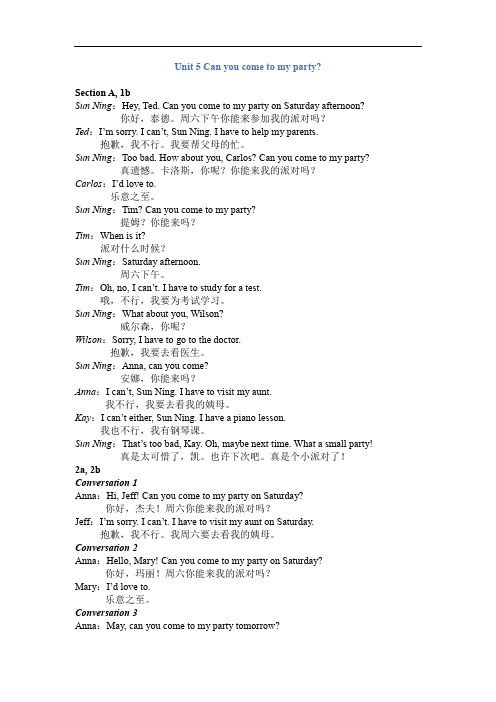
Unit 5 Can you come to my party?Section A, 1bSun Ning:Hey, Ted. Can you come to my party on Saturday afternoon?你好,泰德。
周六下午你能来参加我的派对吗?Ted:I’m sorry. I can’t, Sun Ning. I have to help my parents.抱歉,我不行。
我要帮父母的忙。
Sun Ning:Too bad. How about you, Carlos? Can you come to my party?真遗憾。
卡洛斯,你呢?你能来我的派对吗?Carlos:I’d love to.乐意之至。
Sun Ning:Tim? Can you come to my party?提姆?你能来吗?Tim:When is it?派对什么时候?Sun Ning:Saturday afternoon.周六下午。
Tim:Oh, no, I can’t. I have to study for a test.哦,不行,我要为考试学习。
Sun Ning:What about you, Wilson?威尔森,你呢?Wilson:Sorry, I have to go to the doctor.抱歉,我要去看医生。
Sun Ning:Anna, can you come?安娜,你能来吗?Anna:I can’t, Sun Ning. I have to visit my aunt.我不行,我要去看我的姨母。
Kay:I can’t either, Sun Ning. I have a piano lesson.我也不行,我有钢琴课。
Sun Ning:That’s too bad, Kay. Oh, maybe next time. What a small party!真是太可惜了,凯。
也许下次吧。
Unit 5 Can you come to my party?Section B 1a-2c

Unit 5 Can you come to my party?Section B 1a-2c 星火 一中
教
者
年
级
年
八 2012-
英语Βιβλιοθήκη 设计 来源自我设计教学 时间
学 习 目 标 重 点 难 点
学 习 方 法
Knowing : 本课的 2 个单词和 8 个短语。 Habit-forming: A:What 's today? B: It's Monday the 14th. A: Can you play tennis with me? B: Sorry , I can't . I have to go to the doctor. Practising: 会谈论周日,日期; 能用邀请话题进行会话交际
评 价 与 反 思
达 标 检 测
编号:
一、根据句意及首字母补全句子 1. Lucy is babysitting her sister t___________. 2. It's Tuesday today, so it's T_________ the day after tomorrow. 3. Can you come to my b___________ party? 4. It's Friday today , so it's S_________ the day after tomorrow. 二、情景练习,补全对话 A: Hi, Tom. Can you go to the movies with me? B: Uh, when? A: Today. B: Sorry, I can't. I __________________(得去看医生)this morning and ___________________(为数学考试而学习)in the afternoon. A: How about tomorrow? B: Sorry, tomorrow I ____________________________(打算和朋友一起去踢球) A: Well , what are you doing _______________________________?(后天) B: I _____________________________.(得上钢琴课) A: Oh, I see. B: I'm sorry , I'm really busy this week. (三)用动词的适当形式填空 (1)How often does your sister_____________(eat) junk food? (2)My father ususlly ________(take) a walk after dinner. (3)Can he ________(go) fishing with me after dinner? (4)What _________he ____________(do) last night ? (5)My mother and I ____________(go) shopping next Sunday. (6)______you _________(go) to party with me this weekend?
Unit 5 Can you come to my party?Section A 1a-2c

1. I have to go to the doctoron Tuesday.(划线提问)
__________ __________ you have to go to the doctor ?
2. They have to see the doctor tomorrow .(同义句)
Kay : I can’t , __________ , Sun Ning . I have a piano lesson .
Sun Ning : That’s too dad , Kay . Oh , maybe __________ __________ .
What a small party !
难
点
学习并掌握如何提出邀请与谢绝他人邀请的对话。
学习方法
Listening and writing methods.
Pairwork.
学
习
过
程
词组:
1.备考_______________2.帮助我父母________________
3.去看医生_________________4.看望我姑姑________________
星火一中导学案设计
题目
Unit 5 Can you come to my party?Section A 1a-2c
课时
1
学校
星火
一中
教者
年级
八年
学科
英语
设计
来源
自我设计
教学
时间
2012- 10– 19
学
习
目
标
1. Key vocabulary : lesson , Ted , Kay , Lisa
八年级英语上册 Unit 5 Can you come to my party教材全梳理 人教新目标
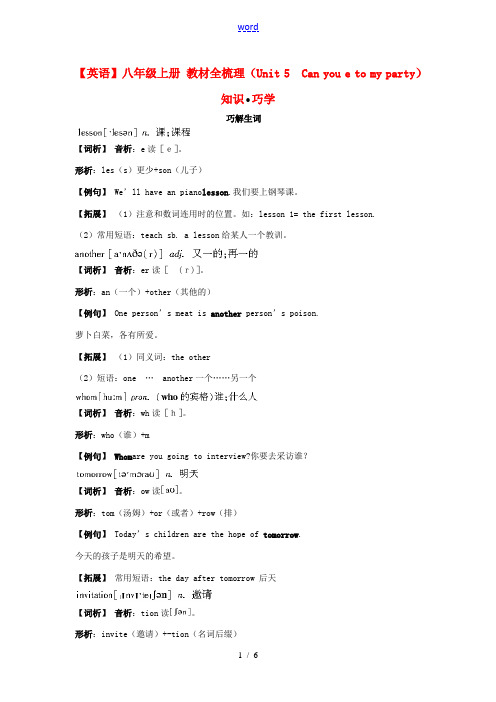
【英语】八年级上册教材全梳理(Unit 5 Can you e to my party)知识•巧学巧解生词【词析】音析:e读[e]。
形析:les(s)更少+son(儿子)【例句】We’ll have an piano lesson.我们要上钢琴课。
【拓展】(1)注意和数词连用时的位置。
如:lesson 1= the first lesson.(2)常用短语:teach sb. a lesson给某人一个教训。
【词析】音析:er读[(r)]。
形析:an(一个)+other(其他的)【例句】One person’s meat is another person’s poison.萝卜白菜,各有所爱。
【拓展】(1)同义词:the other(2)短语:one…another一个……另一个【词析】音析:wh读[h]。
形析:who(谁)+m【例句】 Whom are you going to interview?你要去采访谁?【词析】音析:ow读。
形析:tom(汤姆)+or(或者)+row(排)【例句】Today’s children are the hope of tomorrow.今天的孩子是明天的希望。
【拓展】常用短语:the day after tomorrow 后天【词析】音析:tion读。
形析:invite(邀请)+-tion(名词后缀)【例句】 Thanks for your invitation! 谢谢你的邀请!【拓展】(1)同根词:invite(2)常用短语:a letter of invitation 一封邀请信【词析】音析:i读[I]。
形析:形近词city【例句】It’s a pity that you did not e.很遗憾你没来。
【拓展】(1)惯用法:What a pity!真遗憾!(2)短语:feel pity for sb. 同情某人;out of pity出于同情【词析】音析:o读。
鲁教版英语七下Unit 5《Can you come to my party》(SectionB 2a-4)ppt课件

end of this month to visit my aunt and uncle.
However, I’d still be glad to help out with any
of the party preparations, like planning the
games. Let me know if you need my help.
2.make an invitation
3.turn down an invitation
Message
New Rely Forward Delete Print
Move to
1 Hi David, What a great idea! I really like Ms. Steen a lot. She helped me to improve my English
Unit 5 Can you come to my party?
2a Make a list of the kinds of parties people have. Birthday party _____________ family party
class party _____________
because she is a fun teacher. To show how
much we’re going to miss her, let’s have a
surprise party for her next Friday the 28th! Can you come to the party? If so, can you
Jake 2 Dear classmates, As I’m sure you know by now, our favorite teacher, Ms. Steen, is leaving soon to go back
Unit 5 Can you come to my party Section B 1a-2c(浙江省绍兴市)
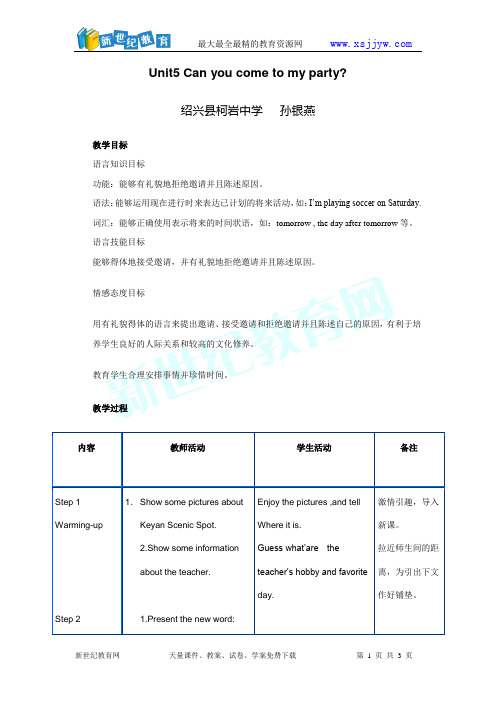
Unit5 Can you come to my party?
绍兴县柯岩中学孙银燕
教学目标
语言知识目标
功能:能够有礼貌地拒绝邀请并且陈述原因。
语法:能够运用现在进行时来表达已计划的将来活动,如:I’m playing soccer on Saturday.词汇:能够正确使用表示将来的时间状语,如:tomorrow , the day after tomorrow等。
语言技能目标
能够得体地接受邀请,并有礼貌地拒绝邀请并且陈述原因。
情感态度目标
用有礼貌得体的语言来提出邀请、接受邀请和拒绝邀请并且陈述自己的原因,有利于培养学生良好的人际关系和较高的文化修养。
教育学生合理安排事情并珍惜时间。
教学过程
Guessing
game: Listen and whether the teacher’s friends or
the family members can go or
not.
Ask two questions, then play the
tape.
Guess and tell the reasons.
Read the questions and
复习旧知为更多
的输出作准备。
听力练习,感受。
Unit 5 Can you come to my party?Section B 3a-4

题目
Unit 5 Can you come to my party?Section B 3a-4
课时
5
学校
星火
一中
教者
年级
八年
学科
英语
设计
来源
自我设计
教学
时间
2012- 10– 22
学
习
目
标
Knowiome to my party?
thank you for可接名词或动名词。
3、have to为“不得不,必须”,后加动词原形。
例:我每天必须六点钟起床。
Tom不得不照看他的妹妹。
要点讲解:have to与must的区别
have to和must都有“必须”的意思,那么它们有哪些不同呢?
(1)含义和用法上的区别:
have to强调客观上需要做某事,即表示外界条件的需要不得不做某事,含有“形势逼迫”的意味;must强调说话者主观上认为必须做某事,含有“主观判断”的意味,例如:
_____15___soon,
Lily
学习3b
1、听录音,完成课文。
2、完成下列短语:
看医生为英语考试而学习
和父母一起度假收假后给我打电话
3、熟读课文。
1、拒绝别人的邀请时常用哪两个句型?
2、总结e-mail的书写格式。
达
标检测
一、补全句子:
1、I'mfor my(化学)text next week.
When is it ?及回答语。.
Practicing:熟练运用本课句型发出邀请,会写e-mail拒绝别人的邀请
重
点
写e-mail拒绝别人的邀请。
难
Unit 5 Section A (2d-3c)Can you come to my party?_英语_初中_蒋淑彦_3706830008
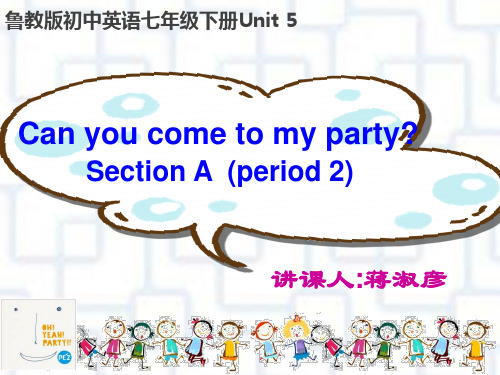
礼貌航标
After you.
Excuse me.
Could I get by?
(借过)
Hold on(请稍等).
Age before beauty. 老人优先。
Sorry to be a bother. 抱歉打扰了.
Pardon?(请再说一遍好吗)
文明礼貌记心中
show love to others …
Nick
奖O励h,:Sam! 小I r组em加e5m分ber we
went bike riding together
last fall when he visited you.
听,模仿 注意语音语调
Jeff
Yes, that's right.
I'd love to come, but I’m
Nick
鲁教版初中英语七年级下册Unit 5
Can you come to my party?
Section A (period 2)
讲课人:蒋淑彦
Make ,accept or refuse invitations. Write an invitation and reply to it.
(会发出、接受或拒绝邀请,并会写邀请函与 回复函。)
亲爱同学们!七月十九日我在掖 县公园举办一个party,邀请大家 参加,我们可以放风筝、骑自行 车、唱歌……,这是我们交流、 放松的最好方式!请大家本周日 前回复。
4人一组,帮助Monitor 设计邀请函, 要求内容全面、准确,书写规范。
给Monitor 回复吧
Can you come to my party?
A stranger(陌生人) stopped an 8-year-old student in Shuangyu Primary School on April 10,2015. He said “Your mother is not available. Can I take you to your home for your mother?” (A bad man)
Unit 5 Can you come to my party Section A (1a-2c)

4. Claudia can / can’t come to the
party.
5. Paul can / can’t come to the party.
2
May
3
Claudia Jeff
A:Can you come to my party? B:Sure, I’d love to .
A: Can you…(with us)?
Sum up
How to make(发出) an invitation?
• Can you/she/he…?
Sum up
How to accept(接受) an invitation?
• Sure, I’d love/like to. • Of course, I’d love/like to.
A: Can you come to my party?
B: Sorry, I can’t. I have to…
study for a test
visit my grandma go to the doctor
clean my room
babysit my sister go to my piano lesson help my mother practice my guitar
doctor.
Report
I want to … this Sunday. (go to the movies/beach…) Name can / can’t Why
Reporter: I’m going to … this Sunday. Tom would like to. He likes it very much. But Mary can’t. She has to… And Lucy can’t , either. Because she has to….
Unit 5 Can you come to my party?Section A 3a-4

学
拒绝邀请及理由的阐述
习
拒绝邀请及理由的阐述
过 程
Listening and writing methods. Pairwork.
1.Read the invitation in activity 3a . And complete the conversation . Lisa : Hi , Simon , can you come to my __________ ? Simon : __________ is it ? Lisa : It’s ____________________ at __________ . Simon : Great ! I’d love to . 2.Pairwork . Check the card with your partner . And then invite him or her to the event . A: Hi , B , can you ________________________________________ ? B: When is it ? A: It’s ________________________________________ . B: Where shall we meet ? A: ______________________________ . B: Great ! I’d love to . 3.Pairwork . Look at the calendar for this week and find a time when they can both go to the mall . A: Lu Qing , can you go to the mall this week ? B: Sure , I’d love to . When ? A: Well , what are you doing Tuesday afternoon ? B: A: B: A:
- 1、下载文档前请自行甄别文档内容的完整性,平台不提供额外的编辑、内容补充、找答案等附加服务。
- 2、"仅部分预览"的文档,不可在线预览部分如存在完整性等问题,可反馈申请退款(可完整预览的文档不适用该条件!)。
- 3、如文档侵犯您的权益,请联系客服反馈,我们会尽快为您处理(人工客服工作时间:9:00-18:30)。
Explanation
1. can 的用法
(1)表邀请。
若接受邀请,回答为:
OK./All right./Sure./ Of course./Certainly./ Yes(Sure),I’d love(like) to. 若不接受邀请,回答为: Sorry,Ican’t.(+原因)
eg . Can you come to the party?
3) I hope you come to the party.
4) How/What about coming to the party? (2)表能力“能,会”否定句 can’t不能 eg. He can swim,but I can’t. (3)在否定句,疑问句中表示“不可能”或“一定
不”
eg. Can he come ?No,he can’t come.(他会来吗 ?不,他不能来.)
the day after tomorrow 后天 yesterday two days ago the year before last 三个星期后 昨天 两天前 前年 the day before yesterday 前天
after three weeks =three weeks later in two years 过两年
Calendar
Sunday the 10th Monday the 11th Tuesday the 12th go to the dentist play football ……
Wednesday the 13th
Thursday the 14th Friday the 15th Saturday the 16th A: What’s today? B: It’s Monday the 11th . A: Can you go to the mall with me the day after tomorrow? B: Sorry, I can’t. I have to……
surf the internet
go shopping
go to the movies
go camping
go skateboarding
go to the beach
c 3.go to the doctor___ d 1.study for a test___ b 2.help my parents ___
他不能和我们一起去。
而“have to”要加助动词do ,
has to要加助动词does ,还原 have to
had to要加助动词did,还原 have to 才可能完成其疑问、否定句。
3
have to强调客观上需要做某事,即表示外界
• • • • • •
•
条件的需要不得不做某事,含有“客观所迫”的 意味,它有人称和数的变化,可用于多种时态中 ,否定式为“不必”。 must强调说话者主观上认为必须做某事,含有 “主观判断”的意味,它的否定式意为“禁止, 不允许”。 eg. If one gets ill,he’ll have to see a doctor. She has to go to school by bus. We must go to school on time. ---Must I finish the homework now ? ---Yes, you must./No,you needn’t(don’t have to). You mustn’t play football in the classroom.
Invitation
It’s a birthday Party! From whom: Jack Time: This Sunday, at 7:00 Place: Jack’s house, 56
Zhongshan Road Come and join us.
calendar October
I want to … this Sunday. Can you …?
Name can / can’t Why
I’m going to … this Sunday. xxx can come. He / She likes it very much. But xxx can’t. He / She …. And xxx can’t come, either, because ….
Yes/Sure,I’d love/like to. Sorry,Ican’t. I have to help my parents.
其他表邀请的句型:
1) Could /Will/Would you come to the party?
2) Would you like /love to come to the party?
It’s a Birthday Party! For whom: Lisa Time: Friday, October 15, at four-thirty Place: Lisa’s house,15th street Come and join us! Lucy: Hi, Tom, can you come to Lisa’s Birthday Party? When Tom: is it? Lucy: It’sOn Friday, October 15 at four-thirty . Where Tom: is it? house Lucy: It’sLisa’s in , the on 15th street . Tom: Great! I’d love to.
2. Mary can / can’t come to the party.
× 4. Claudia can / can’t come to the party.
can / can’t come to the party.
concert
A: Can you go to the concert with me? B: Sorry, I can’t. I have to/am v-ing… A: That’s too bad. Maybe another time. (=next time) B: Sure. Thanks for asking.
It’s a Birthday Party! For whom: Lisa Time: Friday, October 15, at four-thirty Place: Lisa’s house,15th street Come and join us! Lucy: Hi, Tom, can you come to Lisa’s Birthday Party? When Tom: is it? Lucy: It’sOn Friday, October 15 at four-thirty . Where Tom: is it? house Lucy: It’sLisa’s in , the on 15th street . Tom: Great! I’d love to.
concert
A: Can you…? B: Sorry, I can’t. I have to/am ving…. A: That’s too bad. Maybe another time. B: Sure. Thanks for asking.
Explanation
1. That’s too bad .太遗憾了。表示遗憾或同情。
日 一 二 三 四 五 1 3 10 4 11 5 12 6 13 7 14 8 15 六 2 9 16
17
24
18
25
19
26
20
27
21
28
22
29
23
30
What’s today?
What’s the day after tomorrow?
Today is Monday the 11th.
It is Tuesday the 12th .
Unit 5
Warming- up
A: What is he/ she doing?
A:He/ Can you come my party? B: She isto … ing …. B: Sure, I’d love to.
C: Sorry, I can’t. I have to...
D: Sorry, I can’t. I’m…ing…
What do you want to do this Sunday? Would you like to invite some of your friends to play with you? First list your friends’ names. Then go to ask them and write down their answers.
I want to … this Sunday. Can you …?
Name can / can’t Why
What do you want to do this Sunday? Would you like to invite some of your friends to play with you? First list your friends’ names. Then go to ask them and write down their answers.
2. Maybe another time .
也许换个时间吧。 或Maybe next time .s/the others
1) another another + n.(单数) 三者中或无范围的另一个
eg. This coat is too big. Please show me another one.
2a Listening
1) Can you …?常用于发出邀请.在口语也用would you like to …? Could you …? 2) Sure , I’d love/like to .这是对邀请的肯定回答, 表示接受邀请.Sure用于口语, 相当于Certainly, yes. 3) Sorry, I can’t. 是对邀请的否定回答。Have to “不得不, 必须”,三单用has to .
